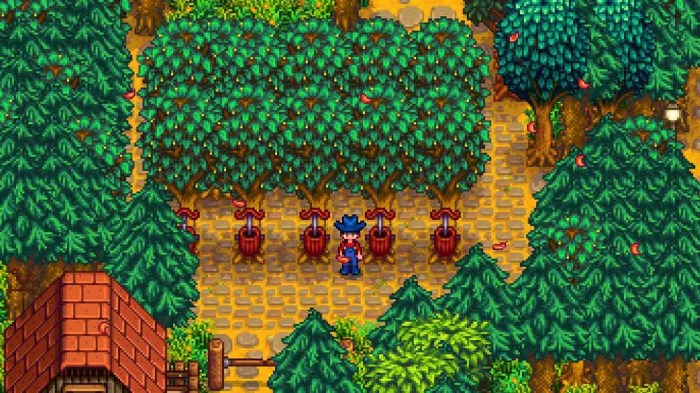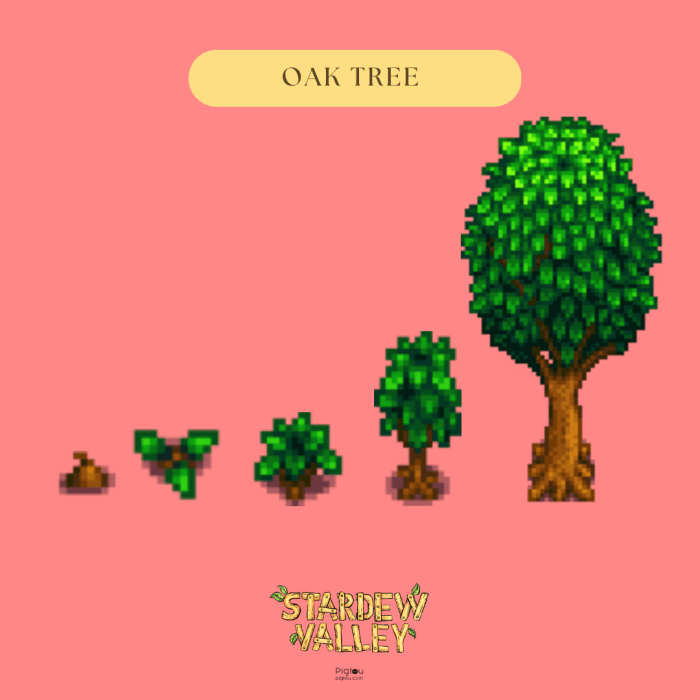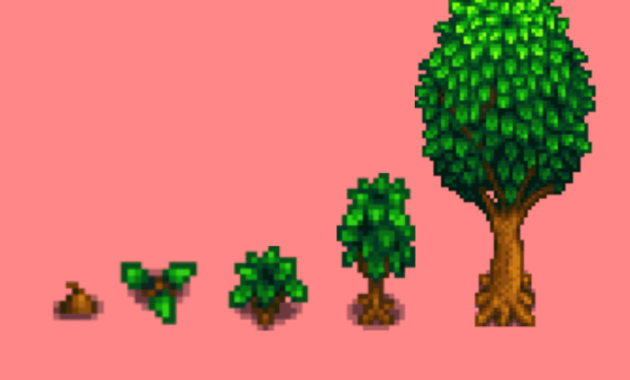Tree Types and Growth in Stardew Valley

Stardew valley plant trees – Stardew Valley’s agricultural system offers players a diverse range of fruit trees to cultivate, each with unique growth cycles and profitability. Understanding these nuances is crucial for maximizing farm efficiency and profits. This report details the various tree types, their growth times, yields, and the impact of growth-enhancing items.
Strategic tree placement is key in Stardew Valley, maximizing profits and aesthetics. Understanding the growth cycles and yields of different fruit trees is crucial for success, much like choosing the right species when landscaping. For instance, if you’re looking for inspiration beyond the game, research on what constitutes good trees to plant in arizona can offer valuable insights into long-term growth patterns and environmental considerations.
Applying this real-world knowledge can help you optimize your Stardew Valley orchard for maximum efficiency.
Fruit Tree Growth Characteristics
The following table summarizes the growth characteristics of different fruit trees in Stardew Valley. Note that these times are subject to potential variations based on the use of fertilizers and other game mechanics.
| Tree Name | Growth Time (Days) | Fruit Type | Fruit Yield (per harvest) |
|---|---|---|---|
| Apple Tree | 28 | Apples | 2-4 |
| Cherry Tree | 28 | Cherries | 2-4 |
| Orange Tree | 28 | Oranges | 2-4 |
| Peach Tree | 28 | Peaches | 2-4 |
| Plum Tree | 28 | Plums | 2-4 |
| Coconut Tree | 28 | Coconuts | 1-3 |
| Mango Tree | 28 | Mangoes | 1-3 |
| Banana Tree | 13 | Bananas | 3-5 |
| Starfruit Tree | 28 | Starfruit | 1-3 |
| Grape Tree | 28 | Grapes | 2-4 |
Fruit Tree Profitability Analysis
Profitability depends on several interacting factors: the sale price of the fruit, the growth time, and the cost of resources such as saplings and fertilizers. While all fruit trees eventually yield a profit, some offer faster returns than others. For example, Banana trees, with their shorter growth time, offer a quicker return on investment compared to other trees with the same yield.
Starfruit, despite a lower yield, commands a significantly higher price per unit, making it potentially more profitable overall. This necessitates a cost-benefit analysis considering both time and market value.
Impact of Growth Enhancers
Fertilizers, such as Deluxe Speed-Gro, significantly reduce the growth time of fruit trees. Speed-Gro can cut down the time required, while other fertilizers may improve the quality or yield. The use of these items influences the overall profitability of fruit tree farming, potentially accelerating the return on investment. The player must weigh the cost of these growth enhancers against the potential increase in profits.
Strategic Tree Placement and Farm Layout: Stardew Valley Plant Trees

Strategic tree placement is crucial for maximizing both space and yield in Stardew Valley. Careful planning ensures efficient resource utilization and prevents overcrowding, leading to higher profits and a more aesthetically pleasing farm. This analysis explores optimal tree placement strategies across different farm layouts, considering factors like tree growth patterns and harvesting convenience.
Farm Layout Designs and Tree Placement Strategies
Three distinct farm layouts illustrate effective tree placement techniques. Each design prioritizes maximizing space and yield while considering tree growth patterns and harvesting efficiency. The following tables detail the proposed layouts, highlighting the type and number of trees planted in each section, along with an estimated yield based on average growth rates and harvest cycles. Note that these yields are estimates and can vary based on factors such as in-game luck and seasonal conditions.
| Farm Section | Tree Type | Number of Trees | Estimated Yield (per harvest) |
|---|---|---|---|
| North (Irrigated) | Mango Trees | 20 | ~60 Mangoes |
| East (Crop Area) | Fruit Trees (mixed) | 10 | ~30 assorted fruits |
| South (Animal Area) | Pine Trees | 15 | ~15 Pine Tar |
| West (Storage & Processing) | None | 0 | – |
| Farm Section | Tree Type | Number of Trees | Estimated Yield (per harvest) |
|---|---|---|---|
| North (Perimeter) | Oak Trees | 30 | ~30 Hardwood |
| East (Perimeter) | Maple Trees | 25 | ~25 Maple Syrup |
| South (Perimeter) | Fruit Trees (mixed) | 20 | ~60 assorted fruits |
| West (Central Area) | Palm Trees | 15 | ~15 Coconuts |
| Farm Section | Tree Type | Number of Trees | Estimated Yield (per harvest) |
|---|---|---|---|
| Central Area | Fruit Trees (high-yield) | 30 | ~90 assorted fruits |
| Perimeter | Hardwood Trees (mixed) | 40 | ~40 Hardwood |
Clustered versus Scattered Tree Planting: Advantages and Disadvantages, Stardew valley plant trees
Planting trees in clusters versus scattering them offers distinct advantages and disadvantages. Clustered plantings, while potentially reducing overall yield due to space constraints, simplify harvesting and management. Scattered plantings maximize the use of available space, increasing potential yield, but can make harvesting more time-consuming. The optimal approach depends on individual farming strategies and preferences. For instance, a player prioritizing efficient harvesting might choose clustered fruit trees, while a player focused on maximizing overall lumber production might opt for scattered hardwood trees.
Practical Tips for Efficient Tree Management
Efficient tree management involves strategic planning and the use of tools. Using fertilizers, especially Deluxe Speed-Gro, significantly accelerates tree growth. Regular harvesting prevents overcrowding and maintains optimal yield. Careful placement of scarecrows and sprinklers minimizes pest damage and ensures consistent watering, especially crucial for fruit trees. Planning tree placement around existing farm structures and other elements maximizes space and workflow.
FAQ Explained
What are the best trees for early game profit?
Early game, fruit trees like blueberries (fast growth, good profit) or cranberries (though requiring more initial investment) offer a strong return. Focus on quick-growing options to generate early capital.
How do I prevent tree diseases?
Regularly check your trees for signs of disease. Use fertilizer to maintain health and prevent disease outbreaks. Remove diseased trees promptly to avoid spreading.
Can I move trees once planted?
No, trees cannot be moved once planted. Careful planning of your farm layout is crucial.
What’s the best way to water trees?
Watering cans are efficient for individual trees, but sprinklers are more effective for large orchards. Consider the layout and the size of your orchard when deciding.

